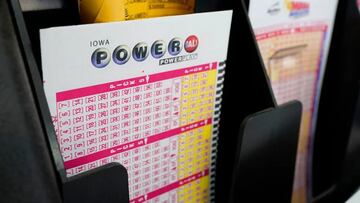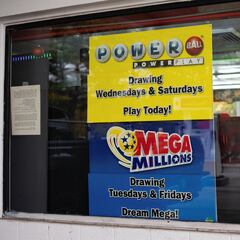Which states participate in Powerball? Where can’t you play the lottery?
Powerball jackpots have been swelling, as too has interest in playing to have a shot at the windfall. But the game isn’t available in all of the states.

The Powerball is one of the most popular and most lucrative lotteries in the country even though you have a better chance of being struck by lightning than at winning the jackpot. The game can be played in a number of states, all of whose takes from ticket sales are put into one pile to compete for during the thrice weekly drawings.
In total, 45 states plus Washington DC, the US Virgin Islands and Puerto Rico are involved in the Powerball and history has suggested that some areas tend to fare better than other. Indiana is responsible for the most with 39 Powerball winners.
But while the vast majority of states run their own lotteries, there are some who do not and whose residents are therefore must go out of state to purchase a ticket for a chance at the Powerball jackpot or buy one online. The are no rules that you must be a resident of the state where you play nor a US citizen for that matter.
The five states without state lotteries are Alabama, Alaska, Hawaii, Nevada and Utah.
You're more likely to go pro in the NBA than hitting a Powerball or Mega Millions jackpot. Good luck, though! pic.twitter.com/jxOOeu2u1T
— USA TODAY Money (@USATODAYmoney) June 19, 2023
Why don’t some states have lotteries?
Laws on gambling and lotteries are largely decided at a state level meaning that there are very different rules on and perceptions of the practices across the country. The five states who do not have lotteries have decided to abstain for a variety of reasons.
Hawaii, for example, is thought to be reluctant to encourage gambling for fear that it might damage the state’s lucrative tourism industry. In a similar vein, the strong religious sentiment in Alabama and Utah could well explain why state legislators are reluctant to allow a lottery.
At the other end of the scale, the likes of Nevada is clearly very open to the practice of gambling but still choose not to have a state lottery. This could well be because the local casino industry is so valuable that the introduction of a potential ‘rival’ could affect their revenues.
Related stories
“[Casinos] say the more money people are spending on lotteries, the less they have to spend in casinos,” reports the Las Vegas Review-Journal. “The casinos’ position on a state lottery has been so unwavering that it’s entirely unsurprising when a lottery proposal is rejected by the state legislature.”
Finally, Alaska is also yet to introduce a state lottery but there seems little chance of one emerging in the near future. The state’s tax revenue is swelled with the local oil industry to such an extent that there is little need to search for additional money streams.


